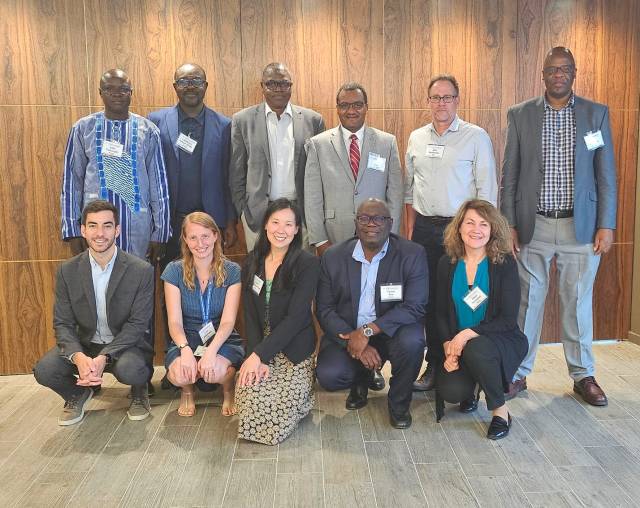You are here
Fighting Meningitis with Surveillance and Data Management
The 26 countries of the meningitis belt of Africa, an area that extends from Senegal in the west to Ethiopia in the east, have endured seasonal outbreaks and devastating epidemics of bacterial meningitis for over a century. Meningitis spreads quickly and causes inflammation around the brain that can become fatal in hours.
Vaccine campaigns across the region have helped protect millions of people. In 2010, a vaccine for serogroup A meningococcal meningitis, a strain that previously caused 80–85% of the meningitis epidemics in the meningitis belt, was introduced. In response to an outbreak earlier this year, Nigeria became the first country to roll out a new conjugate vaccine offering protection against five strains of meningococcus bacteria.
Yet despite these and other advances, the meningitis belt continues to experience the highest number of cases in the world with a staggering 470 million people at risk.
“The main challenge in managing meningitis is getting real-time data to detect early outbreaks,” said Felix Tarbangdo, epidemiologist and data manager for Davycas International, a nonprofit that specializes in disease monitoring and control. “The other challenge is how to get enough vaccines to all the districts experiencing outbreaks.”
In July, the CDC Foundation hosted a four-day data management retreat for our partners in MenAfriNet, an international network of public health organizations that includes the U.S. Centers for Disease Control and Prevention (CDC), the World Health Organization (WHO) and WHO Regional Office for Africa (WHO-AFRO) and Davycas International. Established with an initial grant from the Bill & Melinda Gates Foundation, MenAfriNet has been working to support high-quality meningitis surveillance, improve lab capacity and monitor the impact of vaccine programs across the region for over a decade.
Surveillance and data management systems are important tools that can help countries evaluate the effectiveness of vaccines, detect disease outbreaks quickly and save lives. During the July retreat, one of our goals was to identify ways to strengthen national data management systems and ensure these systems are compatible with WHO-AFRO’s regional data repository on the Digital Health Information Systems (DHIS2)—a free, open-source health management software platform. This interoperability will make it easier for countries to share critical information on disease outbreaks and create a central repository for meningitis surveillance data. Discussions included a focus on the System for Tracking Epidemiological Data and Laboratory Specimens (STELab), a data platform that MenAfriNet helped to implement in Burkina Faso and Niger. STELab modernizes the meningitis response process by using barcodes for rapid reporting and specimen tracking nationwide.
“STELab provides real-time data for decision-making,” Tarbangdo said. “It’s interoperable with other systems, and it’s a multi-disease platform so it reduces the number of databases needed.” Learn more about STELab in this CDC Foundation blog.
The retreat also served as an opportunity for partners to share and understand each organization's evolving priorities over the course of MenAfriNet’s lifecycle. These considerations guided conversations on how to foster strong partner collaborations to strategically carry out activities and objectives moving forward. Specifically, partners discussed how MenAfriNet’s work to strengthen meningitis surveillance will be integrated into WHO’s Defeating Meningitis by 2030 (DM2030) roadmap.
“MenAfriNet supported the development and beginning of implementation of the World Health Organization’s (WHO) regional framework to defeat meningitis in Africa,” said Professor Andre Arsene Bita Fouda, World Health Organization (WHO) regional meningitis control officer in Brazzaville, Republic of Congo. “Strengthening surveillance and data analytics is essential to the success of this effort that envisions to make Africa free of meningitis by 2030.”
The CDC Foundation is proud to carry on the legacy of MenAfriNet’s work under the DM2030 initiative, and we will continue working with our partners to strengthen the systems for gathering and disseminating critical information about meningitis. At the July gathering, Tarbangdo reflected on MenAfriNet’s unique partnership and the importance of ongoing collaboration in the fight to eliminate meningitis.
“By bringing people together around this effort, we have a synergy of action,” Tarbangdo said. “Together, we will go further.”



